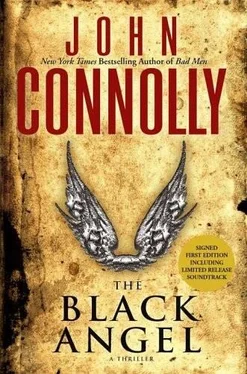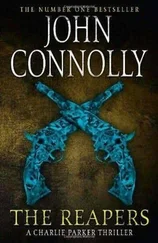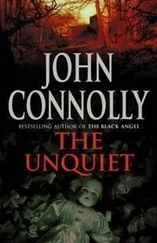The temptation was to press on for Sedlec, which lay about forty miles east of the city, but there were preparations to be made first. In addition, we were tired and hungry. We checked into a small, comfortable hotel in an area known as Mala Strana, which seemed to translate as “Lesser Town,” according to the young woman at the reception desk. Close by, a little funicular railway ran up Petrin Hill from a street named Újezd, along which old trams rattled, their connections occasionally sparking on the overhead lines and leaving a crisp, burned smell in the air. There were cobbles on the streets, and some of the walls were obscured by graffiti. Traces of snow still lingered in sheltered corners, and there was ice on the Vltava River.
While Louis made some calls, I phoned Rachel and told her where I was. It was late, and I was worried that I might wake her, but I didn’t want to just leave the country without letting her know. Her main concern still seemed to be for the dog, but he was safely housed with a neighbor. Sam was doing fine, and they were all planning on visiting Rachel’s sister the next day. Rachel was quieter, but more like her old self.
“I always wanted to see Prague,” said Rachel, after a time.
“I know. Maybe another time.”
“Maybe. How long will you stay there?”
“A couple of days.”
“Are Angel and Louis with you?”
“Yes.”
“Funny, isn’t it, that you’d be somewhere like Prague with them instead of me?”
She didn’t sound like she found it funny at all.
“It’s nothing personal,” I said. “And we have separate rooms.”
“I suppose that’s reassuring. Perhaps, when you get back, you’ll come here and we can talk.”
I noticed that she didn’t say when, or if, she was coming home, and I didn’t ask. I would go to Vermont when I returned, and we would talk, and perhaps I would drive back to Scarborough alone.
“That might be an idea,” I said.
“You didn’t say that you’d like to do it.”
“I’ve never had anyone tell me that we should talk and come out of it feeling better than when I went in.”
“It doesn’t have to be that way, does it?”
“I hope not.”
“I do love you,” she said. “You know that, don’t you?”
“I know.”
“That’s what makes it so hard, isn’t it? But you have to choose what life you’re going to lead. We both do, I guess.”
Her voice trailed off.
“I have to go,” I said. “I’ll see you when I get back.”
“Fine.”
“Good-bye, Rachel.”
“’Bye.”
The hotel booked us a table at a place called U Modre Kachnicky, or the Blue Duckling, which lay on a discreet side street off Újezd. The restaurant was heavily decorated with drapes and rugs and old prints, and mirrors gave an impression of spaciousness to the smaller, lower level. The menu contained a great deal of game, the house’s speciality, so we ate duck breast and venison, the various meats resting on sauces made from bilberry, juniper, and Madeira wine. We shared a bottle of Frankovka wine and ate in relative silence.
While we were still finishing our main courses, a man entered the restaurant and was directed to our table by the hostess. He looked like the kind of guy who sold stolen cell phones on Broadway: leather jacket, jeans, nasty-colored shirt, and a growth of beard that was frozen somewhere between “forgot to shave” and “hobo.” I wasn’t about to point any of this out to him, though. His jacket could easily have contained two of me inside it, as long as someone found a way to release its current occupant from it without tearing it apart in the process, because the leather seemed to be a little tight on him. I wondered if he was somehow related to the Fulcis from way back, maybe from when man first discovered fire.
His name was Most, according to Louis, who had apparently dealt with him before. Most was a papka, or “father,” of one of the Prague criminal brigades, related by marriage to the Vor v Zakone, the “Thief in Law” responsible for all homegrown organized crime. Criminal organizations in the Czech Republic were mainly structured around these brigades, of which there were maybe ten in the entire country. They dealt in racketeering, the smuggling of prostitutes from former Eastern Bloc countries, pandering, automobile theft, drugs, and weapons, but the lines of demarcation between criminal gangs were becoming increasingly unclear as the number of immigrants increased. Ukrainians, Russians, and Chechens were now among the main participants in organized crime in the country, and none of them were reluctant to use violence and brutality against their victims or, inevitably, against one another. Each group had its own areas of specialization. The Russians were more involved in financial crime, while the aggressive Ukrainians favored bank raids and serial robberies. The Bulgarians, who had previously concentrated on erotic clubs, had now branched out into auto theft, drug trafficking, and the supply of Bulgarian prostitutes to brothels. The Italians, less numerous, focused on purchasing real estate; the Chinese favored running casinos and illegal brothels, as well as people smuggling and kidnapping, although such activities tended to remain within their own ethnic groups; and the Albanians had a piece of everything from drugs to debt collection and the trade in leather and gold. The homegrown boys were being forced to battle for their turf against a new breed of immigrant criminal that didn’t play by any of the old rules. Compared to the new arrivals, Most was an old-fashioned specialist. He liked guns and women, possibly both together.
“Hello,” he said. “Is good?”
He indicated the deer medallions in bilberry sauce on Angel’s plate, surrounded by a pile of spinach noodles.
“Yeah,” said Angel. “It’s real good.”
An enormous finger and thumb plucked one of the remaining medallions from Angel’s plate, and dropped it into a mouth like the Holland Tunnel.
“Hey, man,” said Angel, “I wasn’t-”
Most gave Angel a look. It wasn’t threatening. It wasn’t even mildly menacing. It was the look a spider might have given a trapped fly if the insect had suddenly produced a small bill of rights and begun complaining loudly about infringements on its liberty.
“-eating that anyway,” finished Angel, somewhat lamely.
“Way to stand up for your rights,” I said.
“Yeah, well I don’t know what you’re looking so smug about,” he said. “You’re sharing the rest of yours to make up for it.”
The big man wiped his fingers on a napkin, then stretched out a hand to Louis.
“Most,” he said.
“Louis,” said Louis, introducing Angel and me in turn.
“Doesn’t ‘Most’ mean ‘bridge’?” I said. I had seen signs on the streets directing tourists to Karl?v Most, the Charles Bridge.
Most spread his hands in the gesture of delight common to all those who find visitors to their land making an effort. Not only were we buying guns from him, we were learning the language.
“Bridge, yes, is right,” said Most. He made a balancing gesture with his hands. “I am bridge: bridge between those who have and those who want.”
“Bridge between fucking Europe and Africa if he fell over,” muttered Angel, under his breath.
“Excuse?” said Most.
Angel raised his knife and fork and grinned through a mouthful of deer.
“Good meat,” he said. “Hmmmm.”
Most didn’t look convinced, but he let it slide.
“We should go,” he said. “Is busy time for me.”
We paid the check and followed Most out to where a black Mercedes was parked on the corner of Nebovidská and Harantova.
“Wow,” said Angel. “Gangster car. Very low-key.”
Читать дальше












